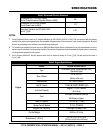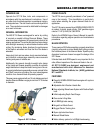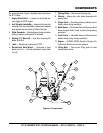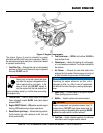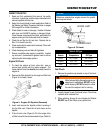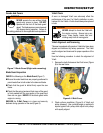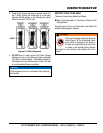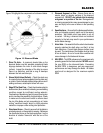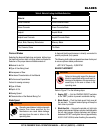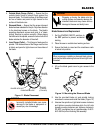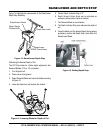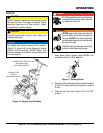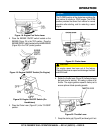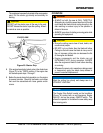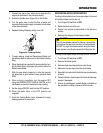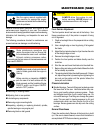
SP118 PAVEMENT SAW • OPERATION MANUAL — REV. #1 (05/03/12) — PAGE 25
BLADES
Diamond Blades
Selecting the diamond blade type and grade defines how
the blade will perform both in cutting speed and blade life.
Selection of the proper diamond blade consists of:
Material to be Cut
Type of Saw Being Used
Horsepower of Saw
Hardness Characteristics of the Material
Performance Expectations
Factors for sawing economy:
Type of Blade
Depth of Cut
Sawing Speed
Characteristics of the Material Being Cut
Blade Speed
WARNING
Operating saw blades at rotational speeds
greater than those specified by the
manufacture can cause blade damage,
and may injure the user or others in the
operating area.
A diamond blade’s performance is directly connected to
specific peripheral (rim) speeds.
The following shaft rotational speeds have been factory set
to ensure optimum blade performance:
• SP118 18” Capacity - 2,836 RPM.
BLADE PLACEMENT
Refer to Figure 11 for the following steps.
1. Engine OFF — Set the ENGINE ON/OFF switches
to the "OFF" position to prevent accidental starting.
2. Blade Guard — Pivot the blade guard front cover all
the way back. The guard tension spring will keep the
front cover in position.
3. Blade Hex Nut — Unscrew the spindle nut (right side
loosens clockwise and tightens counter-clockwise while
the left side loosens counter-clockwise and tightens
clockwise. DO NOT overtighten the nut (approximately
45-50 ft. lb/61-68 N/m) when finalizing the assembly.
WARNING
Failure to thoroughly inspect the diamond
blade for operational safety could result in
damage to the blades or the saw and may
cause injury to the user or others in the
operating area.
Table 6. Material Listing And Blade Selection
Material Blade
Cured Concrete Cured Concrete Blade
Green Concrete Green Concrete Blade
Asphalt Asphalt Blade
Asphalt over Concrete Asphalt/Concrete Blade
Block, Brick, Masonry, Refractories Masonry Blade
Tile, Ceramic, Stone Tile Blade



